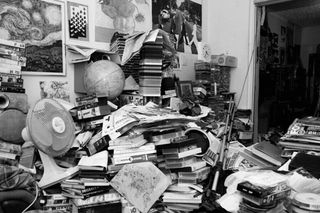
Why Do Some People Hoard Things?
People hold onto things out of a need for safety, security, and stability, or because making decisions about what to throw away becomes too stressful.

Just like some of us can’t let go of memorabilia that we may have an emotional connect to, some people can’t let go of mundane things like a toaster that they may not have used since they were in college, piles of newspapers dating back years, or perhaps even, watches that are beyond repair. But, what are the motivations behind hoarding stuff that often lack monetary, or even functional, value?
A 2011 study suggests that the struggle to get rid of things, can be linked to an individual’s self-worth — instead of viewing the possessions as “mine,” the individual begins to perceive them as “me.” An individual, who values success immensely, may hoard a stack of report cards from school, or a now defunct CD player, or even a piece of ribbon they were awarded accomplishing something — because they serve as reminders of past successes. Individuals may struggle to throw away these physical manifestations of their triumphs, because they may feel like it somehow takes away from their achievements. In the same way, people also hold on to gifts from loved ones, that may not be of any use to them anymore, because they serve as a reminder of the fact that they are, or were once, loved and appreciated. In addition, sometimes reminiscing about the past can simply evoke nostalgia, and make us feel good, warm, and socially connected.
People can also hold onto things out of a need for safety, security and stability. “You may think, ‘I’ve used this tool one time and I may never use it again — but what if I need it in the future? I want to be able to have that thing at that time to address that need,'” Dr. Frank Niles, social scientist and life and business strategist, told NBC. Experts also believe that holding on to excessive amounts of something, can sometimes make people feel safer, and therefore, happier. This can, perhaps, be best demonstrated by the recent example of people stockpiling illogically large proportions of pasta and toilet paper during the initial days of the Covid19-spawned lockdown. They were stressed about the prospect of running out of these — and, hence, felt safe knowing that they had enough to get by. This could also be perceived as widespread planning, although in a rather uncoordinated fashion, that led to hoarding behavior, simply because of the sense of security and stability it afforded amid a global crisis.
Related on The Swaddle:
Why Do People Still Believe In Astrology?
Interestingly, hoarding can sometimes result from perfectionism too — odd as that may sound. Experts believe that perfectionists often worry so much about what to keep and what to throw, that decision becomes too stressful, and overwhelms them to a point, where they keep everything — so as to avoid making a decision altogether.
Like most things, hoarding can also result from formative childhood experiences. Having grown up in poverty and being deprived, or being neglected and denied warmth, could lead to holding onto material possessions — first, because past deprivation can lead one to value the possessions more; and second, upon being neglected as a child, the individual may have developed an emotional attachment to inanimate objects, which they find soothing. Further, it is also believed that people, who have grown up around family members that hoard, are more inclined to hoard because of learned habits and behaviors. Another reason why people hold onto things is because they don’t think they have the permission to get rid of them, Dr. Mark Banschick, psychiatrist, wrote in Psychology Today, adding that he has to reassure them that they are now adults, and are allowed to make their own decisions.
Related on The Swaddle:
Why Do People Feel Morbid Curiosity?
Often, hoarding serves as a coping mechanism too. First, people are hardwired to think that the past was better than the present. “When times get tough, we’ll look at pictures from that trip to Europe or senior year of high school and only remember the good pieces, [and] tend to forget the bad stuff,” Dr. Niles explained. Some people admit to hoarding as distractions from feeling anxious, upset, or afraid, and also as a result from losses or traumatic experiences. “[Hoarding is] a coping mechanism. There can be a number of reasons, but it’s about filling a void, an emptiness, with stuff. Bereavement is one of the biggest triggers. It acts as a sort of nest, a security blanket, a form of emotional insulation,” Jo Cooke, Director of Hoarding Disorders UK, said.
In 2013, hoarding was defined as a mental health disorder, according to DSM V. However, in order to determine whether the behavior is simply a personal preference or a disorder is to ascertain whether it is negatively impacting daily functioning of the individual. “It has to be damaging in some aspect of life,” Dr. Julie Pike, psychologist, explained, citing examples like when it becomes a safety hazard, or when it begins to impact the individual’s relationships with people. While all instances of hoarding don’t necessarily qualify as disorder, experts say that hoarding doesn’t have to be a “stand-alone” problem either, and can often occur alongside, or as symptoms of, OCD, depression, anxiety, impulse control problems, and ADHD, among others. It can also be genetic.
For those who need help getting rid of material possessions, Cognitive Behavioral Therapy, or CBT, is recommended. It is, in fact, believed to more useful than medication, especially if it involves a therapist visiting the hoarder’s home, and helping them through consistent behavioral programs aimed at de-cluttering.
Devrupa Rakshit is an Associate Editor at The Swaddle. She is a lawyer by education, a poet by accident, a painter by shaukh, and autistic by birth. You can find her on Instagram @devruparakshit.
Related


Finland Pilots Program to Have Dogs Sniff for Covid19‑Positive Passengers at Airport
